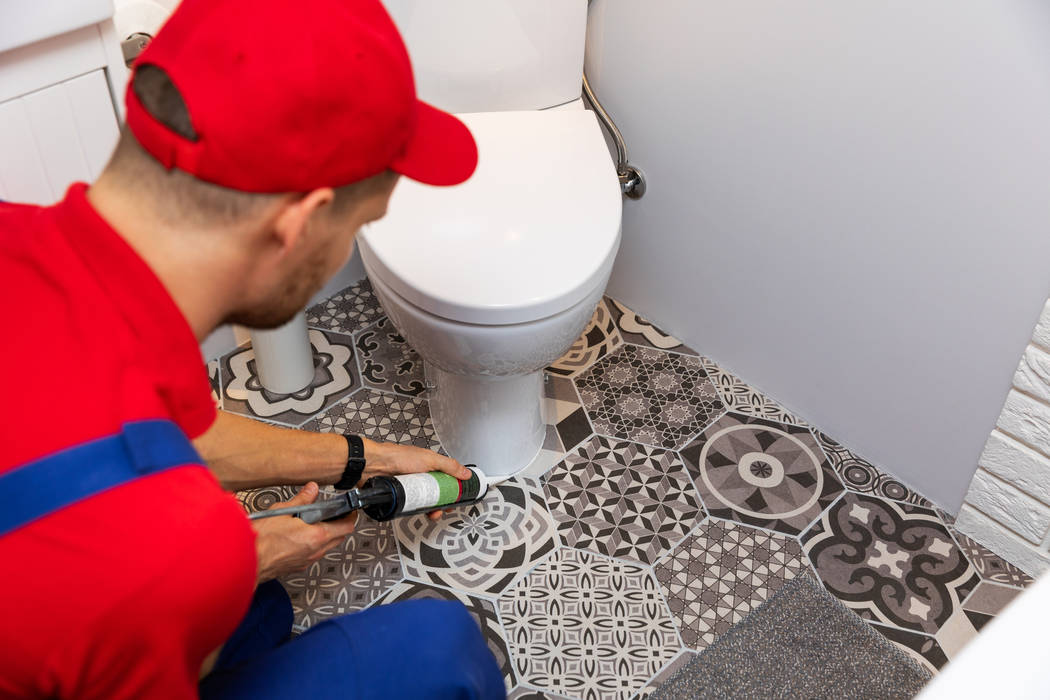Replace ring to fix leaking toilet
Q: I had water leaking from underneath my toilet where the toilet meets the floor. My neighbor agreed to help me replace the wax ring underneath. We got the toilet off with no problem, but when we cleaned off the wax from the floor, we noticed that the retaining ring is broken. What do we do now?
A: You may want to stuff a rag into the top of the pipe to keep the sewer smell at bay and find another toilet to use for the next hour or two.
The leak was caused by poor contact between the wax ring and the horn (the bottom of the toilet). The reason for the poor contact was a rocking toilet, that is, a toilet that wasn’t properly secured to the floor.
A toilet can become loose if the flange breaks, if a bolt holding the toilet to the flange breaks or if the toilet wasn’t installed correctly. You can also get a leak by changing the flooring, raising its level to where the wax ring no longer contacts the flange and horn properly, and not compensating for it.
This happens a lot when homeowners install ceramic tile in an upstairs bath. Not only will the tile raise the height, but the underlying mortar and cement board do as well. All this leaves the flange stuck in a hole when it used to be level with the floor.
You can replace the flange or repair it. It is much easier to repair it.
You can buy a reinforcement ring that screws on top of the broken flange. The ring will keep the toilet sitting in the same footprint. You can buy a ring with small tabs on it that will screw into the wood subfloor or concrete slab, or you can buy a ring without the tabs that screws directly into the broken flange.
Clean off all of the old wax from around the broken flange and the bottom of the toilet. Set your reinforcement ring on top of the flange and orient it until the slots are aligned. If you are using the ring with tabs, mark the locations of the tabs on the floor and predrill the holes.
For a wooden subfloor, use stainless steel screws; for a concrete slab, use masonry screws. Use the appropriate masonry bit for chewing through the concrete.
Lay a thick bead of silicone around the inside of the flange so there are no gaps between it and the reinforcement ring when it is installed. Lay the reinforcement ring over the flange and screw it down. Now you’re ready to reinstall the toilet.
Insert the toilet bolts into the grooves of the reinforcement ring and push them near the end of the slot. The bolts need to be aligned so that when the toilet is reset, they will easily go into the holes of the toilet’s base.
Once you have the bolts in the proper location, push the plastic friction washers over each bolt. These washers simply hold the bolts in position as you lower the toilet back down.
With the toilet on its side, use a scraper and clean any old wax from around the horn.
Buy a new wax ring with a polyethylene sleeve. The sleeve will help guide the waste down the pipe. Place the wax ring around the horn with a slight twisting motion (the rounded end goes against the toilet, and the sleeve will go into the flange). This will hold the wax ring in place as you lower the toilet.
Straddle the toilet and hold it over the bolts. The toilet is heavy, so waddle it into position. This is the important part. You want to place the toilet over the bolts and gently guide it down so that the bolts pop through the holes and the wax ring seats against the new reinforcement ring.
Once the toilet is in position, place your weight on it. You will feel the ring compress into place. You are done once the toilet is resting on the floor around its entire perimeter.
Place the plastic washer from the bolt cap on the bolt first, followed by the bolt washer and then nut. Tighten the nuts a little at a time until the toilet is snug. Do not overtighten these nuts or you may crack the toilet. If the toilet won’t move, you’re done tightening. You can nudge the toilet with your knee to test it.
Snap the plastic bolt covers onto the washer.
You can caulk the base of the toilet, but I prefer to use plaster of Paris. If you use plaster of Paris, you can smooth some out onto the floor around the footprint of the toilet before you set the toilet on the bolts. Once the toilet is tightened, just wipe up the plaster with a wet sponge.
Mike Klimek is a licensed contractor and owner of Las Vegas Handyman. Questions may be sent by email to handymanoflasvegas@msn.com. Or mail to 4710 W. Dewey Drive, No. 100, Las Vegas, NV 89118. His web address is www.handymanoflasvegas.com.
Do-it-yourself
Project: Repair broken toilet flange
Cost: Under $15
Time: Under 2 hours
Difficulty: ★★★























